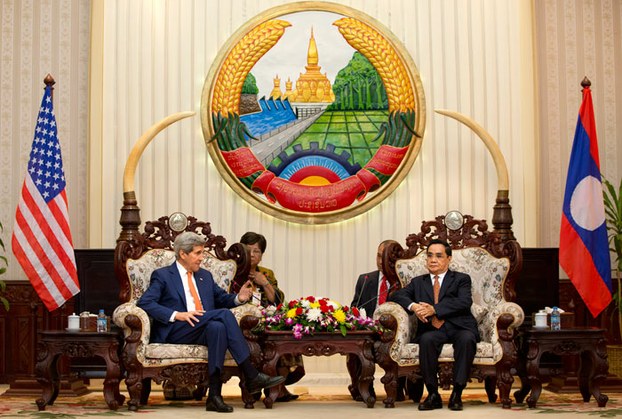




As Laos kicks off its chairmanship of the Association of Southeast Asian Nations, activists fear that the human rights agenda in the country and the region will get swamped by economic concerns and regional discord over issues like the partition of the South China Sea.
“When geopolitical interests are crucial, I am afraid that human rights and democratic values are the very first things to appear in words alone, only to be left out and not truly followed,” Vanida Thepsouvanh, president of the Paris-based Lao Movement for Human Rights told RFA’s Lao Service.
Over the weekend ASEAN foreign ministers met in Vientiane for an agenda-setting retreat in the Lao capital. That meeting follows the organization’s first meeting in the United States which Laos co-chaired earlier in February. U.S. Secretary of State John Kerry also became only the third secretary of state to visit the country when he stopped for a day in January.
Human rights overshadowed
While the ASEAN chairmanship shines a spotlight on this landlocked, communist country of about 6.8 million people, activists fear that the attention fails to illuminate the need for human rights reforms in Laos and some of the other nine member countries.
On Saturday ASEAN issued a statement that was long on defining economic goals and expressions of concern over China's moves to dominate the South China Sea, but was short on mentions of human rights.
“Laos does not need an ASEAN/US summit in Sunnyland [California], nor does it need to chair ASEAN to give basic human rights to the people in Laos,” Vanida said. “Each day is an opportunity to do it, and make it real. It is a matter of will. This political will is absent with the Lao system.”
Amnesty International campaigner for Cambodia, Laos, and Viet Nam Janice Beanland agreed.
Take the example of community development worker Sombath Somphone, she said. Sombath’s Dec. 15, 2012 abduction at a police checkpoint in Vientiane is widely believed to have been carried out by police or some other government-linked group, though authorities have consistently denied playing a role in his disappearance.
“The Lao authorities have steadfastly refused to investigate the enforced disappearance of Sombath Somphone and have even introduced new draconian measures to limit civil society,” Beanland said. “The diplomatic community must make much stronger attempts to encourage Laos to break with the past and its blatant disregard for fundamental freedoms of everyone.”
Laos is not alone in its disregard for civil rights as many ASEAN nations continue to ignore the need to address civil rights issues, she said.
“ASEAN as an organization is failing to respond to the clamor from citizens in the region to address human rights issues,” she said. “It is difficult to see any signs that the human rights situation is going to improve in the near future. Severe restrictions on expression, association and peaceful assembly continue to make it a blind-spot for human rights in Southeast Asia.”
U.S. influence
The Obama administration began its “pivot to Asia” in 2011, and President Obama attended the meeting in Sunnyland, California. He is expected to attend the ASEAN summit in September.
U.S.attention in Southeast Asia should bring a bigger emphasis on human rights, but Washington appears to be more interested in using its influence to counteract China than protecting human rights, Beanland explained.
“The U.S. can be a particularly influential force, but seems more preoccupied with security and pushing back against the influence of China,” she said.
Not everyone in the civil society community is as pessimistic about human rights changes. The spotlight that shines on the ASEAN chair and the need to open up the country to Western investment will turn the tide, a Lao expert on community development told RFA.
“This will be the first time for Laos to express itself to the world,” said the expert, who spoke on condition of anonymity. “This will have a positive impact in the long term even though there is no clear sign of support for human rights now in Laos.”
Reported by RFA's Lao Service. Translated by Ounkeo Sousksavanh. Written in English by Brooks Boliek.